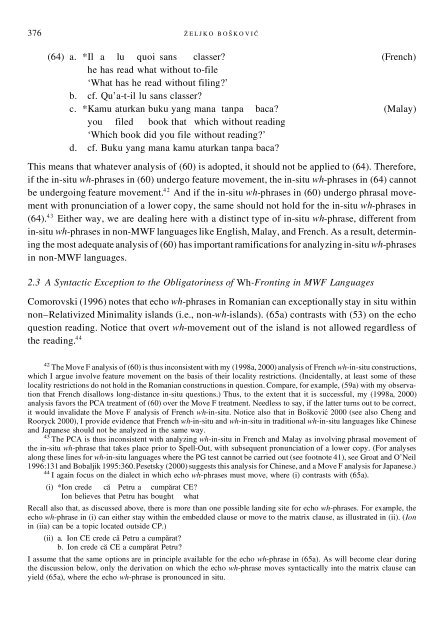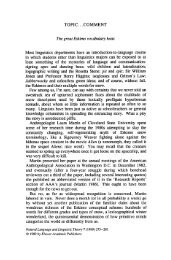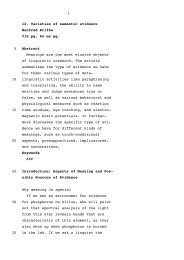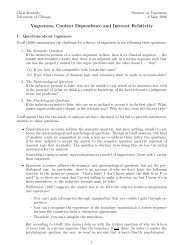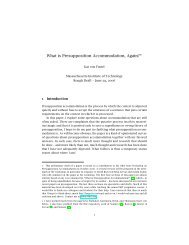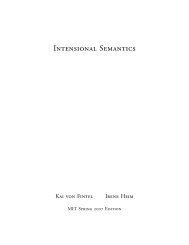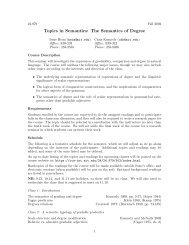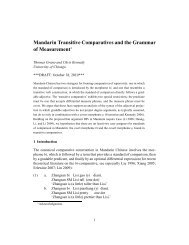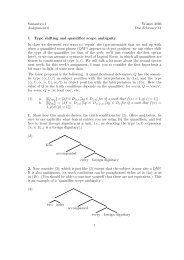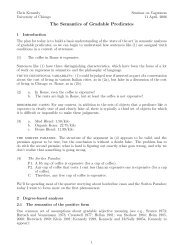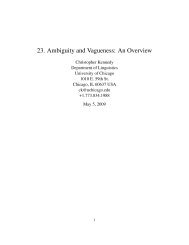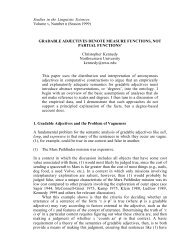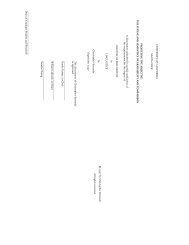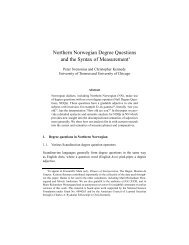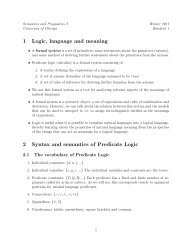On Multiple Wh-Fronting - University of Chicago
On Multiple Wh-Fronting - University of Chicago
On Multiple Wh-Fronting - University of Chicago
You also want an ePaper? Increase the reach of your titles
YUMPU automatically turns print PDFs into web optimized ePapers that Google loves.
376 ZÏ E L J K O B O SÏ K O V I Ć(64) a. *Il a lu quoi sans classer?(French)he has read what without to-file‘<strong>Wh</strong>at has he read without filing?’b. cf. Qu’a-t-il lu sans classer?c. *Kamu aturkan buku yang mana tanpa baca?(Malay)you filed book that which without reading‘<strong>Wh</strong>ich book did you file without reading?’d. cf. Buku yang mana kamu aturkan tanpa baca?This means that whatever analysis <strong>of</strong> (60) is adopted, it should not be applied to (64). Therefore,if the in-situ wh-phrases in (60) undergo feature movement, the in-situ wh-phrases in (64) cannotbe undergoing feature movement. 4 2 And if the in-situ wh-phrases in (60) undergo phrasal movementwith pronunciation <strong>of</strong> a lower copy, the same should not hold for the in-situ wh-phrases in(64). 4 3 Either way, we are dealing here with a distinct type <strong>of</strong> in-situ wh-phrase, different fromin-situ wh-phrases in non-MWF languages like English, Malay, and French. As a result, determiningthe most adequate analysis <strong>of</strong> (60) has important ramifications for analyzing in-situ wh-phrasesin non-MWF languages.2.3 A Syntactic Exception to the Obligatoriness <strong>of</strong> <strong>Wh</strong>-<strong>Fronting</strong> in MWF LanguagesComorovski (1996) notes that echo wh-phrases in Romanian can exceptionally stay in situ withinnon–Relativized Minimality islands (i.e., non-wh-islands). (65a) contrasts with (53) on the echoquestion reading. Notice that overt wh-movement out <strong>of</strong> the island is not allowed regardless <strong>of</strong>the reading. 4 442 The Move F analysis <strong>of</strong> (60) is thus inconsistent with my (1998a, 2000) analysis <strong>of</strong> French wh-in-situ constructions,which I argue involve feature movement on the basis <strong>of</strong> their locality restrictions. (Incidentally, at least some <strong>of</strong> theselocality restrictions do not hold in the Romanian constructions in question. Compare, for example, (59a) with my observationthat French disallows long-distance in-situ questions.) Thus, to the extent that it is successful, my (1998a, 2000)analysis favors the PCA treatment <strong>of</strong> (60) over the Move F treatment. Needless to say, if the latter turns out to be correct,it would invalidate the Move F analysis <strong>of</strong> French wh-in-situ. Notice also that in BosÏ ković 2000 (see also Cheng andRooryck 2000), I provide evidence that French wh-in-situ and wh-in-situ in traditional wh-in-situ languages like Chineseand Japanese should not be analyzed in the same way.43 The PCA is thus inconsistent with analyzing wh-in-situ in French and Malay as involving phrasal movement <strong>of</strong>the in-situ wh-phrase that takes place prior to Spell-Out, with subsequent pronunciation <strong>of</strong> a lower copy. (For analysesalong these lines for wh-in-situ languages where the PG test cannot be carried out (see footnote 41), see Groat and O’Neil1996:131 and Bobaljik 1995:360.Pesetsky (2000) suggests this analysis for Chinese, and a Move F analysis for Japanese.)44 I again focus on the dialect in which echo wh-phrases must move, where (i) contrasts with (65a).(i) *Ion crede caÆ Petru a cumpaÆ rat CE?Ion believes that Petru has bought whatRecall also that, as discussed above, there is more than one possible landing site for echo wh-phrases. For example, theecho wh-phrase in (i) can either stay within the embedded clause or move to the matrix clause, as illustrated in (ii). (Ionin (iia) can be a topic located outside CP.)(ii) a. Ion CE crede caÆ Petru a cumpaÆ rat?b. Ion crede caÆ CE a cumpaÆ rat Petru?I assume that the same options are in principle available for the echo wh-phrase in (65a). As will become clear duringthe discussion below, only the derivation on which the echo wh-phrase moves syntactically into the matrix clause canyield (65a), where the echo wh-phrase is pronounced in situ.


